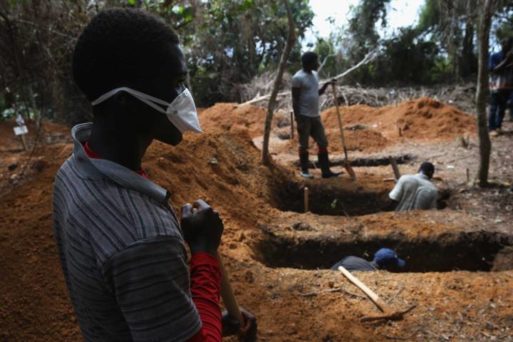Honoring loved ones who have died is very important for the Liberian people. Though there are many regions in Liberia that have differing customs, there are certain beliefs and practices that are employed by many Liberians across the West African country.
Liberia is a predominantly Christian nation with over 4.6 million people. Even though most Liberians are Christian, many still incorporate traditional funeral and burial practices when honoring loved ones. According to Dr. Gabriel Tait of Arkansas State University, “death is an extension of life” for Liberians.

Children wear white to funerals in Liberia
Credit: npr.org
Much of what happens during the funeral and subsequent burial is meant to provide the loved one’s soul a safe voyage to the ancestral world. So it is important that families are able to conduct proper preparations and burial. It is vital that the soul does not make it back to the mortal world. When specific rituals are not completed, the soul of the person who has died will stay in a state of limbo, resting between the mortal world and afterlife.
A funeral celebration in Liberia can last for days or even weeks. Days of mourning will be followed by a wake and funeral. Anyone who had a meaningful relationship with the person who has died will travel long distances to pay their respects. Thus, the more people the person died knew, the longer the celebration will last. During the funeral itself, men typically wear suits; women wear black outfits or church robes and children wear white.
It is very important in Liberian culture to touch and cleanse the body of the person who has died. One funeral procession covered by NPR lasted an entire day. After close family members washed and dressed the body of the woman, the mourners walked two miles to the burial site. Trumpeters and drummers went ahead, playing and marching for the entirety of the procession.
Funerals in Liberia are not just the burying of a body. They are a way to connect the loved one who has died with their ancestors. If the body is not properly taken care of, that can have negative implications on the still-living family members.
“So if things are going really badly — you lose your job, your child flunks out of school — among the things you’re trying to figure out is, have I offended somebody?” says Mary Moran, an anthropologist at Colgate University.”And that someone could be living or dead.”
One common practice in Liberia is to take photos of the loved one who has died and share those photos with family members. Liberia suffered through two civil wars during the past thirty years, and during that time many people had no idea what had happened to loved ones. So now, proof of death is necessary for at least some sense of closure.
Another common ritual is for close family members to cover up all reflective surfaces in the room where a loved one’s body is being held. This is meant to prevent the loved one’s spirit from roaming about, as it’s believed they are attracted to reflective surfaces.
Burial Practices Are Vital In Liberia
Employing proper funeral and burial practices is of the utmost importance in Liberian culture. This was particularly evident during the Ebola crisis of 2014. One of the reasons why the Ebola outbreak hit West Africa as hard as it did was because of the common practice of cleansing and touching the body of loved ones.

Even during the Ebola outbreak, Liberians were committed to proper burials
Credit: time.com
Ebola is contracted through bodily fluids, including sweat and saliva. Cremation is not a proper way of body disposal in Liberia, so even during the disease outbreak, many Liberians still wanted to practice traditional burial methods. This caused a rift between Liberians and healthcare workers.
During the outbreak, as reported by The Guardian, beds in Ebola treatment centers were empty because either the sick or their families wanted to stay home to ensure a proper burial. When people died from the disease, many times they were buried secretly.
This is because it’s important for Liberian families to know exactly where their loved one is buried. Families have “decoration days” during which they clean and decorate the gravesites of relatives. During the Ebola outbreak, the government would take it upon itself to cremate the bodies and dispose of the remains without disclosing the locations to families.
It’s clear that proper burials of loved ones in Liberia is one of the most important aspects of Liberian culture. Even during a deadly disease outbreak, the practices were still employed. This is clear evidence that burial in Liberia is a sacred act that cannot be overlooked.
Did you enjoy this post? If so, check out our article about the conflict between the Liberian people and the government during the Ebola outbreak.

 Funeral and Burial Practices in Liberia
Funeral and Burial Practices in Liberia


 “Making Mobiles” by Karolina Merska
“Making Mobiles” by Karolina Merska
 “Hands Up to the Sky” by Michael Franti & Spearhead
“Hands Up to the Sky” by Michael Franti & Spearhead
 Coping With Election Grief
Coping With Election Grief














